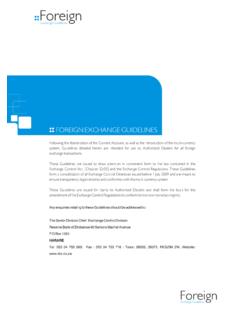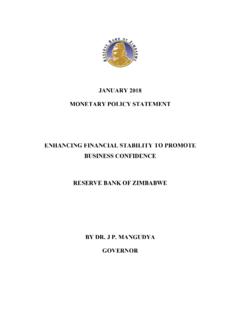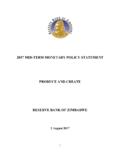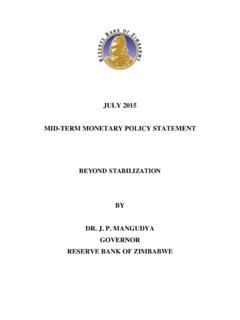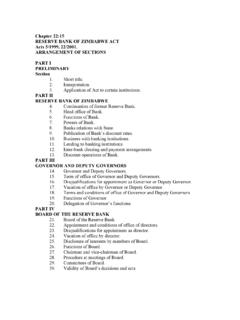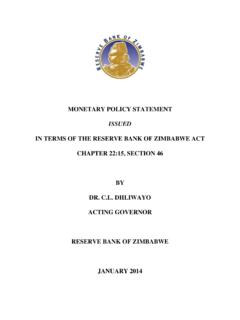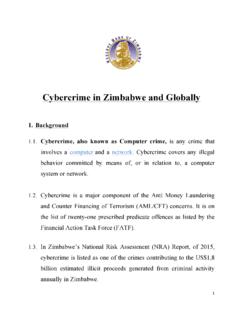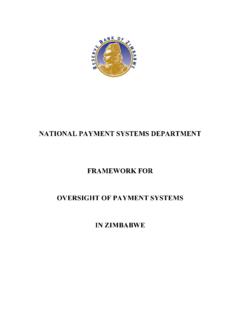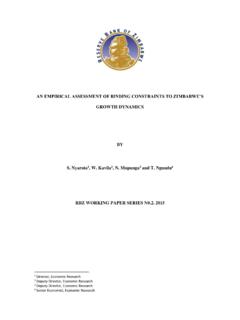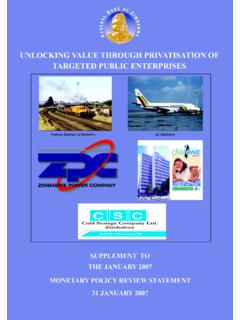Transcription of ECOGAD7/2016 - Welcome to the Reserve Bank of …
1 1 | P a g e ecogad7 / 2016 FOR USE BY AUTHORISED DEALERS AND THE PUBLIC EXCHANGE CONTROL OPERATIONAL GUIDELINES AND COMPLIANCE FRAMEWORK TO AUTHORISED DEALERS On Exchange Control Policies and Compliance Measures Issued in the January 2016 Monetary Policy Statement 8 February 2016 This ecogad7 / 2016 is issued as an addendum to Exchange Control Directive RR27 dated 8 February 2016 as part of policy and administrative guidelines for new policy measures and Compliance Measures announced in the January Monetary Policy Statement issued by the Governor, Dr. J. P. Mangudya. 2 | P a g e TABLE OF CONTENTS 1. TREATMENT OF INDIVIDUAL TRANSACTIONS .. 3 2. UTILISATION OF CREDIT/DEBIT CARDS BY INDIVIDUALS .. 8 3. CROSS BORDER (OFFSHORE) INVESTMENTS BY INDIVIDUALS .. 9 4. TREATMENT OF FUNDS FOR NGOS, EMBASSIES, INTERNATIONAL ORGANISATIONS AND NON-RESIDENT INDIVIDUALS & CORPORATES .. 10 5. PROMOTION OF PLASTIC MONEY AND bank TRANSFERS.
2 10 6. ENHANCEMENT OF THE RTGS SYSTEM TO CATER FOR MULTIPLE CURRENCIES .. 11 7. SERVICE AGREEMENTS BETWEEN RELATED & UNRELATED COMPANIES .. 12 8. PURCHASE OF SOUTH AFRICAN RAND AND OTHER CURRENCIES BY THE Reserve bank OF ZIMBABWE .. 14 9. INVESTMENTS ON STOCK MARKET .. 15 10. REVIEW OF PRICING OF EXTERNAL LOANS .. 16 11. PROFIT SHARING ARRANGMENTS FOR SELECTED SECTORS .. 18 12. UPWARD REVIEW OF LIMITS ON NOSTRO BALANCES .. 19 13. REDUCTION OF ANNUAL BRANCH FEES IN RURAL AREAS .. 20 14. GOLD PRODUCTION POLICY MEASURES .. 20 15. DIAMOND PRODUCTION .. 21 16. CONCLUSION .. 22 3 | P a g e 1. TREATMENT OF INDIVIDUAL TRANSACTIONS During the Zimbabwe Dollar era, both residents and non-residents were allowed to open individual foreign currency accounts using funds emanating from offshore. These funds were deposited with Authorized Dealers and were treated as free funds as they did not emanate from local sources.
3 Following the adoption of the multicurrency system and the subsequent liberalisation of the Current Account in February 2009, individuals were allowed to operate Individual Foreign Currency Accounts (IFCAs). However, as money is fungible, deposits into individual FCAs were no longer limited to offshore funds but also included salaries, donations, alimony, proceeds from sale of property, sole trader business, farming and sale of shares among others. Given that money is fungible and the fact that the country is using multi-currencies, there is no longer any difference between foreign currency earned from offshore sources or domestic activities. It should also be noted that under the multicurrency system, the country s sources of liquidity are; i. Exports; ii. Diaspora remittances; iii. External loans and grants; and iv. Foreign investments. These sources of liquidity need to be sustained for the progressive betterment and development of the country.
4 4 | P a g e Consequently, the new policy to align the treatment of individual and corporate funds in a manner that takes into cognisance the fungibility status of money, is meant to achieve the following objectives: i. Aligning the country s treatment of individual transactions to regional and global best practices; ii. Mitigating against malpractices of circumventing regulations by transferring company funds into individual accounts, for the purposes of externalisation under the guise of free funds; iii. Account for the country s foreign currency resources; iv. Reduce incidences of illicit financial flows and implementation of anti-money laundering regulations in line with international best practices; v. Promote internal investments which in turn will usher in numerous opportunities in the various sectors of the economy; vi. Enhancing market liquidity by allowing internal circulation of the limited foreign currency; vii.
5 Promoting market confidence; and viii. Promoting the operation of corporate accounts by businesses and sole traders. Given the need to attain the aforementioned objectives, Authorised Dealers are hereby directed that all individual cross border payments, for both goods and services, require to be supported by relevant invoices from suppliers and service providers to ensure that they are bona-fide transactions. Individual imports with a value in excess of USD5,000 require to be acquitted in the CEBAS system by the Authorised Dealer. 5 | P a g e In this regard, individual importers shall submit Bills of Entry (Import) to the Authorised Dealer to confirm receipt of goods into the country within 90 days from the date of effecting payment. Failure to account for one s imports shall be a violation of Exchange Control Regulations. Authorised Dealers are also directed that, with immediate effect, payments for external services shall only be effected upon production of relevant invoices clearly showing the service providers and the amount involved.
6 In order to simplify and reduce the administrative burden on Authorised Dealers when dealing with individual transactions, Exchange Control hereby provides the check list for specific individual transactions. While the check list is meant to assist Authorised Dealers in administering individual cross border transactions, Authorised Dealers are advised to apply the Know Your Customer (KYC) and Customer Due Diligence (CDD). Table 1: Check list for Individual Transactions TRANSACTION TYPE CHECKLIST Business Travel Expenses Confirmation of travel from company. Use of credit/debit cards Maximum cash on person USD5,000 Medical Expenses A referral letter from a local specialist. Pro forma invoices for the foreign hospital or specialist confirming cost of treatment. Education: Tuition Fees, Living Expenses & Pocket Money Authorised Dealers are allowed to process educational fees to meet all expenses directly related to full time or correspondence course of study, including pocket money and living expenses for education, provided the following information shall be submitted; Letters of admission in case of new students; Invoice and /or statement of account from college university; or Any suitable documentary evidence from the institutions.
7 6 | P a g e TRANSACTION TYPE CHECKLIST Examination Fees The remittance of fees by local universities and colleges may be approved on submission of the following:- A list of the students names Documentary evidence from the external Examination Boards confirming amount payable. Expatriates The Authorised Dealer is allowed to remit part of the salary, provided the information detailed under is submitted; Letter of appointment from employer; Copy of payslip. Alimony and Child Maintenance Application letter; Divorce order where applicable; and Children s birth certificate(s). Repairs, Legal Fees and Subscriptions Invoices and/ or; Statements of account; and Renewal notices. Sale of Tours Payment of all-inclusive or package holiday tours outside Zimbabwe is permitted. Payment must be made direct to the travel agent or tour operator outside the country subject to submission of the following in the name of the local tour operator:- A breakdown of the cost of the tour; and A brochure Airfares Invoice Cash donations Beneficiary; Banking details; Relationship; and Motivation for the donation.
8 ZIMRA Tax clearance certificate Amounts in excess of USD10,000 per transaction require prior Exchange Control approval. Pension remittances Letter from pension fund Emigration authority Family Upkeep Application letter Amounts in excess of USD10,000 per transaction require prior Exchange Control approval. Rentals due to non-resident residential property owners Lease agreement 7 | P a g e Depending on frequency and amounts involved, Authorised Dealers shall report suspicious transactions to the Reserve bank . Any request that is not covered under Table 1 above requires prior Exchange Control approval. In addition, prior Exchange Control approval shall be required for the following transactions as is the case; i. Remittance of property sale proceeds; ii. Inheritance transactions involving non-residents; iii. Emigration including temporary and permanent export of personal and household effects.
9 In order to easily track and monitor transactions by individuals, the CEBAS system will be enhanced to enable Authorised Dealers to register individuals conducting cross border payments using their client database, with the National Identity Number (ID) being used as the unique reference number for residents and passport number for non-residents. For accounting purposes under this revised framework, all foreign currency receipts that were previously coded as free funds will now be reported as Diaspora Remittances on ECFORM 1 and coded as follows; Type of Receipt - Diaspora Remittances Receipt Code - DREMIT Sector Codes - INDIV (individuals) - NGOs (NGOs) - EMBS (Embassies) The new list of receipts and respective codes will be as follows; 8 | P a g e Table 2: Revised Foreign Currency Receipts Coding Framework TYPE OF RECEIPT RECEIPT CODE Export Proceeds EXPRO Loan Proceeds LPROC Diaspora Remittances DREMIT Income Receipts (Royalties) INRECEPT ( R) Income Receipts (Dividends) INRECEPT ( D) Income Receipts (Other) INRECEPT (O) Capital Investments KINVEST Compliance Parameter Authorised Dealers shall apply KYC, CDD and ensure that all the requisite information is furnished to the Authorised Dealer before effecting payment, to the extent possible and practicable.
10 2. UTILISATION OF CREDIT/DEBIT CARDS BY INDIVIDUALS For individuals, Authorised Dealers are advised that the issuance of debit/credit cards shall continue to meet individual purchases. However, Authorised Dealers shall be required to report separately all credit/debit card transactions and acquit all transactions in excess of USD10,000 per transaction on CEBAS by the 14th day of the following month reporting transactions of the previous month. For acquittal, Authorised Dealers shall request for Bills of Entry (Import) for goods and completion of Form ECSPAD for services. 9 | P a g e Any card transactions below the USD10,000 threshold shall continue to be lumped per card holder and reported on CEBAS by the 14th day of the following month reporting transactions of the previous month. Failure to account for one s imports shall be a violation of Exchange Control Regulations and or Anti-Money Laundering Regulations.
